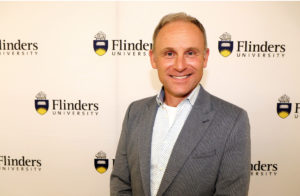
South Australians suffering from atrial fibrillation are benefiting from a clinical trial led by Flinders Caring Futures Institute researcher, Professor Jeroen Hendriks.
Atrial Fibrillation (AF) is the most common heart rhythm disorder and is characterised by an irregular and often rapid heart rate that can increase the risk of strokes, heart failure and other heart-related complications. Consequently, hospitalisation for AF has increased significantly over the years.
The Integrated Care (iCARE) AF trial based at the Royal Adelaide Hospital (RAH) aims to reduce hospitalisations and deaths from the condition.
Professor Hendriks says 90 patients are currently involved in the trial, with four new nurses recently coming on board to help deliver the intervention at the RAH. The next step will be setting up clinics at The Queen Elizabeth Hospital and Flinders Medical Centre.

“Patients are very happy with the service, given there is more time for them to talk about their condition and worries, but also to be educated, empowered and guided in their self-management and lifestyle modification,” says Professor Hendriks.
“The iCARE-AF Clinics are based on the concept of integrated care which has been identified a suitable approach to provide comprehensive care and treatment to AF patients. It uses a patient-centred approach, where a multi-disciplinary team (including a cardiologist, nurse, the patient, and their carer) are engaged in the treatment, supported by use of technology.
“Our team collaborates with the patient and their carers to identify risk factors, such as obesity, sleep apnoea, high blood pressure or diabetes and introduces a comprehensive treatment plan covering these aspects. The approach includes the treatment of AF, prevention of strokes, and the management of risk factors.”
In addition to face-to-face consultations in the clinic, patients use an app on their phone or tablet, which provides them with information on AF, the symptoms and treatment, risk factors, and how to modify their lifestyle. They can also input incidents of AF and any other symptoms they are experiencing, which can then be discussed with the iCARE-AF team.
“The use of new technology to support the health care professionals and treatment team also plays a key role, with decision-support technology guiding the clinical team through the care process,” Professor Hendriks adds.
The trial aims to track the treatment of about 1,400 AF patients over several years.
“I recently delivered a lecture to the nurses at RAH, who got really excited and contacted me afterwards to check how they could get involved and help recruit patients. This shows a great interest in the trial from the nursing profession,” Professor Hendriks says.
“Additionally, based on strong consumer interest in the Murray Mallee region, we could potentially expand our service to remote areas by making use of mHealth and eHealth interventions.”
In 2017 and 2018 there were over 72,000 hospitalisations for AF in Australia and the condition was associated with 9% of deaths in 2018.
In other news, Professor Hendriks received the prestigious SIGMA International Nurse Researcher Hall of Fame award in Edinburgh, Scotland, in July this year, where he also presented his integrated model of care program of research to an international audience. At the recent European Society of Cardiology conference in Barcelona, Spain, Professor Hendriks was invited to provide a lecture on the meaning and importance of integrated care in AF.

